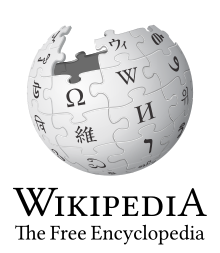Wikipedia:The Free Encyclopedia
This is an essay. It contains the advice or opinions of one or more Wikipedia contributors. This page is not an encyclopedia article, nor is it one of Wikipedia's policies or guidelines, as it has not been thoroughly vetted by the community. Some essays represent widespread norms; others only represent minority viewpoints. |
| This page in a nutshell: Wikipedia is "free" as in free software and free culture, not necessarily "free beer" and "free speech". |

The subtitle of Wikipedia is the free encyclopedia that anyone can edit.
The main meaning of "free"[edit]
The Encyclopædia Britannica says the following interesting thing about the history of dictionary publishing:
The next important dictionary to be published was an English–French one by John (or Jehan) Palsgrave in 1531 ... and a letter has survived showing that he arranged with his printer that no copy should be sold without his permission, lest his proffit by teaching the Frenche tonge myght be mynished by the sale of the same to suche persons as, besids hym, wern disposed to studye the sayd tongue.[1]
The English word "free" has several meanings. The word "free" in "The Free Encyclopedia" refers first and foremost to the licensing terms of Wikipedia's content. Text is contributed to Wikipedia under the terms of the Creative Commons Attribution-ShareAlike License (CC-BY-SA) and the GNU Free Documentation License (GFDL)—copyleft licenses for free content. It mainly means that the rights on the text belong to its authors, but the text may be freely read, distributed and modified as long as the modified versions are distributed under the same licenses. Read the full text of the licenses for the precise legal terms.
The goal of such licensing is producing reference material free to all people—a collection of human knowledge, which cannot be limited or controlled by restrictive use of copyright law and which, under most reasonable conditions, can be used and shared by everyone without any hindrance. Thus Wikipedia reverses the restrictive trend set by John Palsgrave half a millennium ago.
Uploading to Wikipedia of information whose copyright terms are not compatible with CC-BY-SA or GFDL is not allowed. If uploaded, such data will be promptly deleted. The only exception to this is that the English Wikipedia allows limited uploading of some images and media files under "fair use" terms; see Wikipedia:Non-free content for details. Wikipedias in some other languages, for example Spanish, do not allow "fair use" content at all and include nothing but free content.
The other meanings of "free"[edit]
Some people misunderstand the subtitle "the free encyclopedia that anyone can edit", often because of the different meanings of the word "free" in the English language. Wikipedia's co-founder Jimmy Wales said the following about the ambiguity of the English word "free":
We probably run into the problem of the word 'free' in English, which means both "gratis" (free of charge) and "libre" (liberty). We mean primarily the 2nd meaning, but it will depend on the particular language as to whether "libre access" is a concept which can be smoothly expressed. Since we also mean "gratis" as a secondary meaning, that can be used.[2]
Some of these meanings happen to apply to Wikipedia in whole or in part, but they do not necessarily reflect the intention of Wikipedia's existence and must be precisely understood.
"Free Encyclopedia" does not mean "zero price encyclopedia"[edit]
In practice, any person who has access to the World Wide Web may read the content of Wikipedia on the website wikipedia.org without paying any money. This, however, does not mean that Wikipedia content is fully non-commercial. Copies of Wikipedia content can be sold. The CC-BY-SA and GFDL licenses allow charging money for distributing content that they cover. Indeed, parts of Wikipedia were copied to optical media (such as DVD) and printed on paper, and these copies were distributed for money.
Furthermore, it is forbidden to upload to Wikipedia any content whose copyright terms allow only non-commercial use, as this is not compatible with the meaning of "free" as defined by CC-BY-SA and GFDL.
"Free Encyclopedia" does not mean "anyone can edit it however they like"[edit]
"An encyclopedia that anyone can edit" does not refer to the legal or ethical right of any editor to contribute content supporting their own point of view. Some editors understand the "anyone can edit" part of "the free encyclopedia that anyone can edit" as an extension of the word "free". This is wrong, as the sentence encompasses two separate concepts. "Free" refers to licensing, as explained above; "anyone can edit" refers to the fact that Wikipedia is a wiki, a website that nearly anyone with access to the web can edit without asking for permission. However, Wikipedia strives to be a reliable encyclopedia that presents to the reader verifiable information written from a neutral point of view. Anyone can boldly edit Wikipedia as long as they do it in line with these goals, but edit actions that contradict these rules will be reverted and in extreme cases editors who perform them may be blocked.
"Free Encyclopedia" does not necessarily refer to "free speech"[edit]
A common definition of free content and free software is that it is "free as in free speech, not free beer". But yet again, this refers to the licensing of Wikipedia. Wikipedia respects freedom of speech, but it is not a content policy. For more on this, see Wikipedia:Free speech.
See also[edit]
- Wikipedia:Free encyclopedia
- About Wikipedia
- What Wikipedia is not
- Copyrights in Wikipedia
- Wikipedia:Text of the GNU Free Documentation License – the legal license as it applies to Wikipedia
- GNU Free Documentation License, an encyclopedic article about the history of the license and the related movements of Free software and Free content
- Wikipedia:Mirrors and forks
References[edit]
- ^ "dictionary". Britannica Online Encyclopedia. Retrieved 20 October 2008.
- ^ Jimmy Wales, User talk:Chaldean, 31 May 2008; diff.
External links[edit]
- The Free Software Definition by the Free Software Foundation
